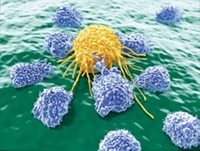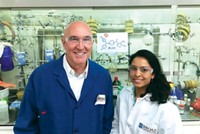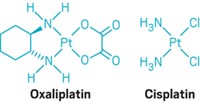Advertisement
Grab your lab coat. Let's get started
Welcome!
Welcome!
Create an account below to get 6 C&EN articles per month, receive newsletters and more - all free.
It seems this is your first time logging in online. Please enter the following information to continue.
As an ACS member you automatically get access to this site. All we need is few more details to create your reading experience.
Not you? Sign in with a different account.
Not you? Sign in with a different account.
ERROR 1
ERROR 1
ERROR 2
ERROR 2
ERROR 2
ERROR 2
ERROR 2
Password and Confirm password must match.
If you have an ACS member number, please enter it here so we can link this account to your membership. (optional)
ERROR 2
ACS values your privacy. By submitting your information, you are gaining access to C&EN and subscribing to our weekly newsletter. We use the information you provide to make your reading experience better, and we will never sell your data to third party members.
Pharmaceuticals
Targeting Housekeeping To Tame Tumors
by Carmen Drahl
July 18, 2011
| A version of this story appeared in
Volume 89, Issue 29
Targeting the cell housekeeping processes that cancer mutations hijack might be as effective at killing tumor cells as targeting the cancer-causing mutations themselves, a study suggests (Nature, DOI: 10.1038/nature10167). The cancer-fighting drug Gleevec targets a specific mutation, or oncogene, and effectively treats cancer patients who have the mutation. But Gleevec and similar genetically matched drugs help only a small percentage of patients. So some scientists are targeting normal cell processes that get co-opted by oncogenes in hopes of achieving Gleevec-like results. Stuart L. Sch reiber of the Broad Institute and Harvard University, Anna Mandinova and Sam W. Lee of Massachusetts General Hospital, and coworkers have found a molecule that selectively kills cancer cells and tumors in mice by blocking a housekeeping process: the ability to quench reactive oxygen species (ROS). That process is crucial for the survival of cancer cells, but not normal cells. The compound, piperlongumine, comes from the Indian long pepper plant. The team now plans to determine the specific cancer-causing mutations that make cancer cells reliant on ROS quenching, and thus vulnerable to piperlongumine, Schreiber says. Mandinova and Lee have started a company called Canthera Therapeutics to exploit the ROS strategy for cancer treatment.





Join the conversation
Contact the reporter
Submit a Letter to the Editor for publication
Engage with us on Twitter